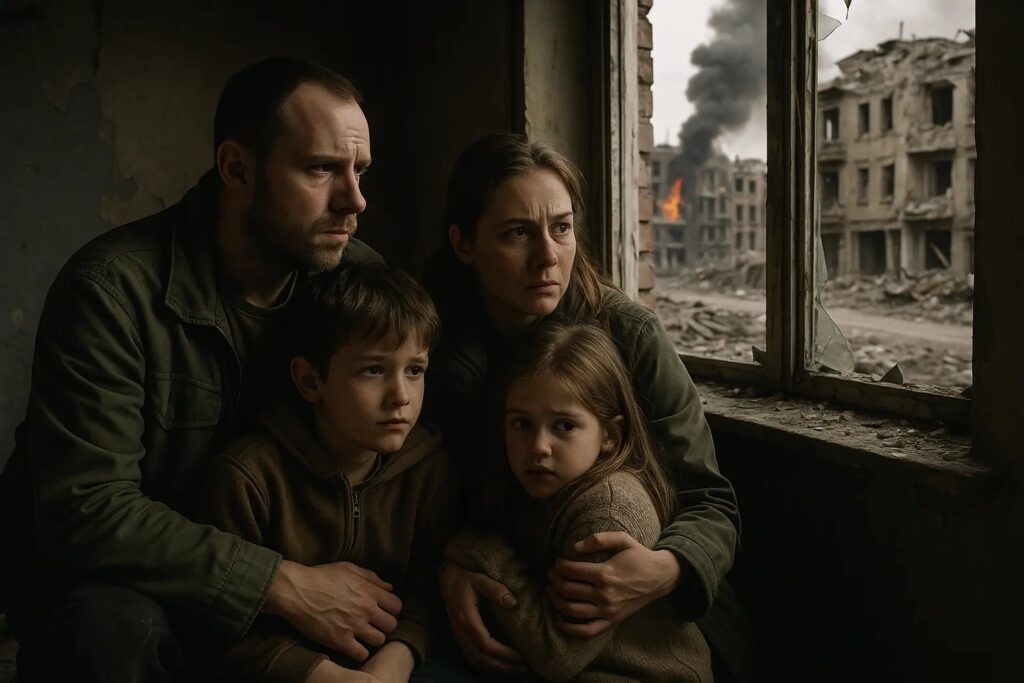War can break out with little warning. Whether it’s political conflict, civil unrest, or an international attack, ordinary people often become its first victims. Survival isn’t about heroics — it’s about preparation, awareness, and quick decisions. This guide will walk you through the real steps you need to take before, during, and after a war to protect yourself and those you love.
Prepare Before War Strikes
Build a Survival Plan
Start by making a clear survival plan. Discuss escape routes, safe zones, and meeting points with your family. Know where you’ll go if your area becomes dangerous — maybe a rural home, a neighboring country, or a neutral zone.
- Keep a printed map in case GPS fails
- Practice evacuation routes with your family
- Choose a place outside major cities if possible
Pack a Survival Kit
War zones often face food shortages, power cuts, and medical emergencies. Your go-bag should include:
- 3+ days of food and water
- First aid kit and medications
- Flashlight, batteries, and power bank
- Personal documents (ID, passport, insurance)
- Cash in small bills (ATMs may stop working)
- Protective gear like gas masks or helmets if possible
Gather Important Information
Collect critical contacts, local emergency numbers, and radio frequencies. Stay updated via battery-powered or crank radios — internet might not work during war.
When War Breaks Out — How to Stay Safe
Don’t Panic — Act Smart
Fear can be deadly. Stay calm and assess the situation:
- Are attacks happening nearby?
- Is it safer to stay indoors or evacuate?
- Listen to official announcements, not rumors
Shelter in Place When Necessary
If leaving is too risky, secure your home:
- Cover windows with tape or heavy materials
- Block light at night to avoid being targeted
- Stay in rooms with few or no windows
- Fill tubs or containers with water
Keep quiet and avoid drawing attention. Looting and armed groups may roam streets. Do not engage with them.
Evacuate Only If You Must
If your home is no longer safe, leave quickly. Take your go-bag and avoid major roads or checkpoints where fighting may occur. Travel only in daylight and stay low if crossing open areas.
Protect Your Health and Sanity
Hygiene Is Survival
Disease spreads fast in war. Clean water and hygiene keep you alive:
- Boil water if unsure about purity
- Wash hands regularly
- Avoid unclean food sources
Mental Strength Matters
War breaks the strongest people mentally. Take care of your mind:
- Stick to routines, even simple ones
- Talk to loved ones when possible
- Focus on survival goals each day
Fear is normal. But don’t let it paralyze you. Staying focused gives you power when the world feels powerless.
Dealing with Soldiers and Armed Groups
Stay Neutral and Unarmed
Unless you’re part of official defense forces, don’t carry weapons. Being seen as a threat can get you killed. Stay away from military zones.
Cooperate, But Don’t Volunteer Info
If questioned, stay respectful but give only necessary details. Never lie, but don’t overshare either. Your safety is more important than opinions.
After the War — Rebuilding Life
Don’t Rush Back to War Zones
Once fighting stops, the danger isn’t over. Mines, unexploded weapons, and disease remain. Wait for official clearance before returning home.
Reach Out for Aid and Support
Seek help from humanitarian organizations, medical centers, and mental health professionals. You’ve survived — now you need to heal.
Conclusion: Be Ready, Not Fearful
War is brutal, unpredictable, and soul-crushing. But with the right preparation and mindset, survival is possible. This isn’t just about stockpiling gear — it’s about resilience, awareness, and calm action. No one wants war. But if it comes, be the one who’s ready.

